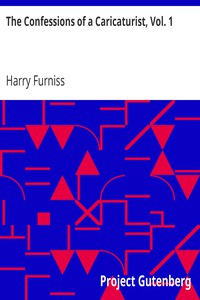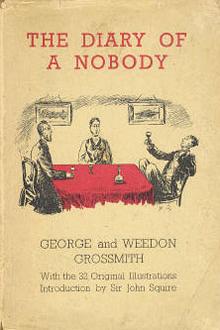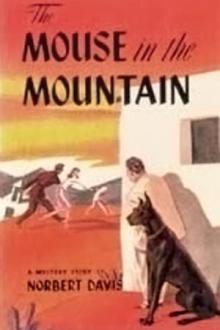The Confessions of a Caricaturist, Vol. 1, Harry Furniss [digital book reader txt] 📗

- Author: Harry Furniss
Book online «The Confessions of a Caricaturist, Vol. 1, Harry Furniss [digital book reader txt] 📗». Author Harry Furniss
If in the old days the Bohemian scribbler was not in Society, he could at least imagine himself there. There was nothing to prevent his speaking of a member of the aristocracy as "one of us" with far less embarrassment and with as much truth as he could nowadays when he is invited—but still as the oil that never will mix with water. Except in imagination—an imagination such as I recollect a well-known figure in literary Bohemia had when I knew it well, a writer of stories for the popular papers: Society stories, in which a Duke ran away with a governess, or a Duchess eloped with an artist, each weekly instalment winding up with a sensational event, so as to carry forward the interest of the reader. This writer—quite excellent in his way—a thorough Bohemian, knowing nothing about the [Pg 40] Society he wrote about, had the power of making himself, and sometimes fresh acquaintances, believe that he played in real life a part in the story he was writing. He did not refer to the experiences as related by him as incidents in his story, but as actual events of the day.
"Brandy and soda? Thanks. My dear fellow, I feel a perfect wreck, shaken to pieces. I had an experience to-day I shall never forget. I have just  THE DUKE OF BROADACRES. arrived from Devonshire; ran down by a night train to look at a hunter Lord Briarrose wanted to sell me. Bob—that is Briarrose—and I travelled together. He is going to be married, you know; heiress; great beauty—neighbour—rolling in wealth. I stopped at the Castle last night, and before Bob was up I was on the thoroughbred and well over the country, returning about eleven along the top of the cliffs. To my horror, I saw a carriage and pair charging down a road which at one time continued a long distance skirting the cliffs. Cliffs had fallen; road cut off; unprotected; drop down cliff eight hundred feet on to pointed rocks and deep sea. There was nothing between the runaway horses and the cliff, except a storm-broken solitary tree with one branch curved over the road. When the horses bolted, the groom fell off. There was only a lady in the carriage, powerless to stop the frightened steeds dashing on to death. As she approached I was electrified. Something told me she was Bob's fianc�e. A moment and I was charging the hunter under that tree. Jumping up out of the saddle, I clasped the solitary branch with both hands, and turning as an acrobat would on a trapeze, I hung by my legs, hands downwards, calling to the lady to clasp them. The fiery steeds and the oscillating carriage dashed under me—our [Pg 41] hands met. With a superhuman effort I raised the fainting fairy form out of the vehicle as it passed like a whirlwind. The next moment horses and carriage were being dashed to pieces on the rocks below. Under our united weight the branch of the tree broke, and we fell unhurt on the moss-covered path. When the eyes of the fair lady opened to gaze upon her deliverer, I started as if shot. She sprang to her feet. 'Reginald!' she cried. 'Is it you?'
THE DUKE OF BROADACRES. arrived from Devonshire; ran down by a night train to look at a hunter Lord Briarrose wanted to sell me. Bob—that is Briarrose—and I travelled together. He is going to be married, you know; heiress; great beauty—neighbour—rolling in wealth. I stopped at the Castle last night, and before Bob was up I was on the thoroughbred and well over the country, returning about eleven along the top of the cliffs. To my horror, I saw a carriage and pair charging down a road which at one time continued a long distance skirting the cliffs. Cliffs had fallen; road cut off; unprotected; drop down cliff eight hundred feet on to pointed rocks and deep sea. There was nothing between the runaway horses and the cliff, except a storm-broken solitary tree with one branch curved over the road. When the horses bolted, the groom fell off. There was only a lady in the carriage, powerless to stop the frightened steeds dashing on to death. As she approached I was electrified. Something told me she was Bob's fianc�e. A moment and I was charging the hunter under that tree. Jumping up out of the saddle, I clasped the solitary branch with both hands, and turning as an acrobat would on a trapeze, I hung by my legs, hands downwards, calling to the lady to clasp them. The fiery steeds and the oscillating carriage dashed under me—our [Pg 41] hands met. With a superhuman effort I raised the fainting fairy form out of the vehicle as it passed like a whirlwind. The next moment horses and carriage were being dashed to pieces on the rocks below. Under our united weight the branch of the tree broke, and we fell unhurt on the moss-covered path. When the eyes of the fair lady opened to gaze upon her deliverer, I started as if shot. She sprang to her feet. 'Reginald!' she cried. 'Is it you?'
 FROM A SKETCH BY HERBERT
FROM A SKETCH BY HERBERTJOHNSON.
"She was my first love. We had not seen each other for years! Thanks. I'll have some more brandy. Hot this time, with some sugar, please."
The following week The London Library appeared. I bought it, and read "The Duke's Oak," all about Lord Briarrose and Lady Betty Buttercup and the runaway horses. The tree with the one branch gave the title to the story, and the Dashing Duke of Broadacres was the aristocratic acrobat—my friend the author!
The Savage Club is a remnant of Bohemian London. It was started at a period when art, literature, and the drama were at their lowest ebb—in the "good old days" when artists wore seedy velveteen coats, smoked clays, and generally had their works of art exhibited in pawnbrokers' windows; when journalists were paid at the same rate and received the same treatment as office-boys; and when actors commanded as many shillings a week as they do pounds at present. This typical trio now exists only in the imagination of the lady novelist. When first the little band of Savages met they smoked their calumets over a public-house in the vicinity of Drury Lane, in a room with a sanded floor; a chop and a pint of ale was [Pg 42] their fare, and good-fellowship atoned for lack of funds. The Brothers Brough, Andrew Halliday, Tom Robertson, and other clever men were the original Savages, and the latter in one of his charming pieces made capital out of an incident at the Club. One member asks another for a few shillings. "Very sorry, old chap, I haven't got it, but I'll ask Smith." Smith replies, "Not a cent myself, but I'll ask Brown." Brown asks Robinson, and so on until a Crœsus is found with five shillings in his pocket, which he is only too willing to lend. But this true Bohemianism is as dead as  THE EARL OF DUNRAVEN AS
THE EARL OF DUNRAVEN AS
A SAVAGE. Queen Anne, and the Savages now live merely on the traditions of the past. His Majesty the King, when Prince of Wales, was a member of the Club, and an Earl takes the chair and entertains my Lord Mayor with his flunkeys and all. The Club is now as much advertised as the Imperial Institute, but the true old flavour is no more. No doubt some excellent men and good fellows are still in the Savage wigwam. Some Bohemians—a sprinkling of those Micawbers, "waiting for something to turn up"—keep up its reputation, but in reality it is only Savage now in name.
I was not thirty when I ceased to be a member. I had been on the committee, and had taken an active part in matters concerning it, until it changed its character and lost its true Bohemian individuality, and being a member of the Garrick Club, I found matured in it the element the Savage endeavoured at that time to emulate. Although I am still in my forties, few of those with whom I smoked the calumet of peace round the camp fire at a great pow-wow in the wigwam of the excellent Savages, alas! remain.
The old Grecian Theatre in the City Road was the nursery of many members of the theatrical profession, and authors too. [Pg 43] Two well-known members of the Savage Club, Merritt and Pettitt, were writers of the  ANOTHER GAP IN OUR
ANOTHER GAP IN OUR
RANKS. common stuff necessary for the melodramas of the kind connected with their names. Merritt would have made an equal fortune if exhibited as the original fat boy in "Pickwick," or as a prize baby at a show. I suppose my readers are aware that it is not necessary to be a baby in order to be exhibited as one, for I recollect, in my Bohemian days, going down to Woolwich Gardens when the famous William Holland was manager of them, and accidentally strolling into a tent outside of which was a placard, "The Largest Baby in the World! 6d." I was not expected,—and the "Baby" was walking about in his baby-clothes, with little pink bows on his shoulders, smoking a horrible black clay pipe. He was the dwarf policeman in Holland's pantomime in the winter-time!
 JOPE.
JOPE.
Merritt would have made a capital prize baby. He was tall, very stout, and possessed of a perfectly hairless, baby's face and a squeaky little voice. I shall never forget a prize remark this transpontine author made in the Savage Club, when an editor rushed in and said, "Have you heard the news? Carlyle is dead!" Merritt rose, and putting his hand on his chest, squeaked out, "Another gap in our ranks!"
A peculiar figure in Bohemia in those old days was "J." Pope, known as "Jope," brother of the late celebrated K.C. Jo was [Pg 44] nearly as large as his brother, the well-known legal luminary, and Paul Merritt rolled into one, and wore his black wide-awake on the back of his pleasing, intelligent head. I saw him one sultry autumn evening leaning against a lamp-post in Chancery Lane to take breath.
"Hullo, Pope, where are you going?"
 H. J. BYRON.
H. J. BYRON.
"My dear boy, let me lean on you a minute. I'm going up to the Birkbeck—to lecture—to lecture on 'Air, and How We Breathe!'"
As a contrast to the popular Doctor was a wit more popularly known, H. J. Byron—as thin as the proverbial lamp-post. Of course the stories about Byron would fill a volume, but there is one that is always worth repeating, and that is his reply to a vulgar and obtrusive stranger who met him at Plymouth, and said to him, "Mr. Byron, I've 'ad a walk hall round the 'Oe."
"Yes, old chap, and the next time you have a walk I advise you to walk all round the H."
In those merry gatherings I recall the familiar features of true Bohemians, when Bohemianism was at its best—not the ornamental names of those one finds mentioned in all reports of the famous gatherings, but of the members who really used and made the Club. Few of the outside public recollect, for instance, the name of Arthur Mathieson, who wrote and sang that pathetic ballad, "The Little Hero"; who also was an actor and writer of ability,—in fact, he was what is fatal to men of his class—a veritable Crichton. Being in appearance not unlike Sir Henry Irving, he was engaged by our leading actor to play his double in "The Corsican Brothers," and made up so like his chief that no one could possibly tell the difference between the two. One evening during the run of the piece an old Irishwoman who was duster of the theatre, and with whom [Pg 45] the genial double of Sir Henry often had a friendly word, approached as she thought the familiar M., and in a rather frivolous mood innocently tickled the actor under the chin with her dusting-broom.
"My good woman, what do you mean?"
The poor Irishwoman dropped on her knees, clasped her hands and said, "The Saints protect me! it's the Masther himself—I'm kilt entoirely."
The "Masther," however, probably enjoyed the humour of it. Sir Henry, like his dear old friend Mr. J. L. Toole, has found a relief in occasional harmless fun. Toole, however, was irrepressible.
 A PRESENTATION.
A PRESENTATION.
I was one day walking with him in Leeds (when he was appearing in the evening on the stage, and I on the platform). A street hawker proffered the comedian a metal pencil-case for the sum of a halfpenny. Toole made this valuable purchase. As soon as I left the platform that night, I found a note for me, inviting me to the theatre directly after the performance. Toole came back on to the stage, and making me an elaborate and complimentary speech, referring to me as "a brother artist in another sphere," etc., etc., presented me with the pencil! I made an appropriate reply, and we went to supper.
The following paragraph from the pen of Mr. Toole appeared in the Press the next day in London as well as the provinces:
"Brother artists, even when working in different grooves, do not lack appreciation of each other's work. After Mr. Harry Furniss's lecture in Leeds the other night, he and Mr. Toole foregathered; and the popular and genial actor presented the 'comedian of the pencil' with a very neat and handsome pencil-case, just adapted for the jotting down, wherever duty takes him, of those graphic sketches with which the caricaturist amuses us week by week."
[Pg 46]
I must confess I am sometimes guilty of mild practical jokes, but I am always careful to select reciprocative and kindred spirits—with such a spirit of practical joking as J. L. Toole, for instance. He and I have had many





Comments (0)